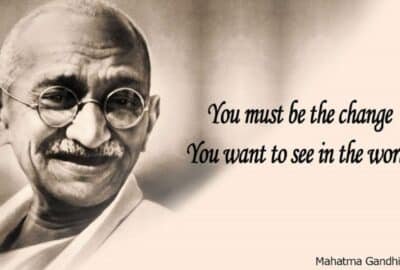Mahatma Gandhi, a revered leader and symbol of nonviolent resistance, once said, “You must be the change you wish to see in the world”. These words encapsulate a profound truth that resonates across time and cultures. They serve as a timeless reminder that the power to transform the world lies within each individual. In today’s ever-changing and complex world, Gandhi’s wisdom holds immense relevance, urging us to take personal responsibility and become catalysts for positive change.
This article delves into the depths of Gandhi’s perspective, explores the significance of his quote, and provides insights on how we can embody this philosophy in our lives. By understanding and embracing Gandhi’s words, we can unlock our potential to make a difference and contribute to a better world.
Through personal transformation, leading by example, taking action, and overcoming challenges, we can harness the power within ourselves to inspire collective impact. Gandhi’s quote is not merely a call to altruism; it is a call to examine our own values, beliefs, and behaviors and align them with the change we desire to see in the world.
Understanding Gandhi’s Perspective
Mahatma Gandhi, often referred to as the “Father of the Nation” in India, was a visionary leader and advocate for nonviolent resistance. His philosophy, known as Satyagraha, emphasized the power of truth and nonviolence in challenging oppressive systems and promoting social change. Central to Gandhi’s beliefs was the idea that change must begin at the individual level.
- The Individual as the Source of Change: At the heart of Gandhi’s philosophy lies the recognition that individuals possess the agency to initiate profound change in the world. He believed that in order to see the world transform, we must first transform ourselves. Gandhi’s quote, “You must be the change you wish to see in the world,” encapsulates this idea. It urges individuals to take personal responsibility, examine their own actions and attitudes, and align them with the ideals and values they seek to see in society.
- Self-Reflection and Self-Transformation: Gandhi emphasized the importance of self-reflection and self-awareness in the pursuit of personal and societal change. He encouraged individuals to question their own prejudices, biases, and habits, and to cultivate qualities such as compassion, empathy, and humility. By undergoing a process of self-transformation, individuals could become beacons of light, inspiring others and effecting meaningful change.
Leading by Example
One of the fundamental aspects of being the change we wish to see in the world, as advocated by Gandhi, is leading by example. Our actions and behaviors have the power to inspire and influence others, creating a ripple effect of positive change. Here are key points to consider in leading by example:
- Authenticity and Integrity: Leading by example begins with authenticity and integrity. It involves aligning our words and actions, living in accordance with our values, and being true to ourselves. When we demonstrate consistency between our beliefs and behaviors, we inspire trust and credibility in others. By embodying honesty, transparency, and ethical conduct, we set a strong foundation for leading by example.
- Compassion and Empathy: By genuinely understanding and relating to the experiences and challenges of others, we foster a sense of connection and build bridges of understanding. Through acts of kindness, generosity, and empathy, we can inspire others to cultivate compassion and contribute to a more compassionate world.
- Active Listening and Respect: To lead by example, it is essential to cultivate active listening and respect for others. By truly listening to the perspectives, needs, and concerns of those around us, we create an environment of inclusivity and collaboration. Valuing diverse opinions and treating others with respect fosters an atmosphere where individuals feel heard and valued, encouraging them to engage in positive action.
- Taking Responsibility and Initiative: We must be proactive in initiating positive change rather than waiting for someone else to do it. By demonstrating initiative, courage, and a willingness to step outside our comfort zones, we inspire others to do the same and become active agents of change.
- Humility and Continuous Learning: Leadership by example also requires humility and a commitment to continuous learning. Recognize that no one has all the answers and that growth is an ongoing process. Embrace feedback, be open to new perspectives, and acknowledge and learn from mistakes. By embodying a growth mindset and demonstrating a willingness to learn and evolve, we encourage others to do the same.
- Inspiring and Empowering Others: Celebrate the achievements and strengths of those around you and provide support and guidance where needed. Create opportunities for collaboration, mentorship, and leadership development. By empowering others to embrace their own capacity for change, we multiply the positive impact and create a collective force for transformation.
Conclusion
Mahatma Gandhi’s timeless quote, “You must be the change you wish to see in the world,” serves as a guiding principle for personal and collective transformation. Throughout this article, we have explored the depth of Gandhi’s perspective and the significance of leading by example in bringing about positive change.
By understanding Gandhi’s philosophy, embracing personal transformation, and embodying the values and virtues we hold dear, we unlock our potential to be catalysts for change. Through self-reflection, self-awareness, and a commitment to growth, we can align our behaviors with our vision of a better world.
Leading by example involves authenticity, integrity, compassion, and empathy. It requires active listening, respect for others, and a willingness to take responsibility and initiative. By demonstrating humility, continuous learning, and a commitment to inspiring and empowering others, we create a ripple effect that transcends our individual actions.
Now, more than ever, the world needs individuals who are willing to be the change. Let us rise to the challenge, embrace Gandhi’s wisdom, and make a difference in our own lives and the lives of those around us. Together, we can build a world that reflects the values of peace, justice, and equality, one action at a time.
Also Read: Kindness is one thing you can’t give away. It always comes back


